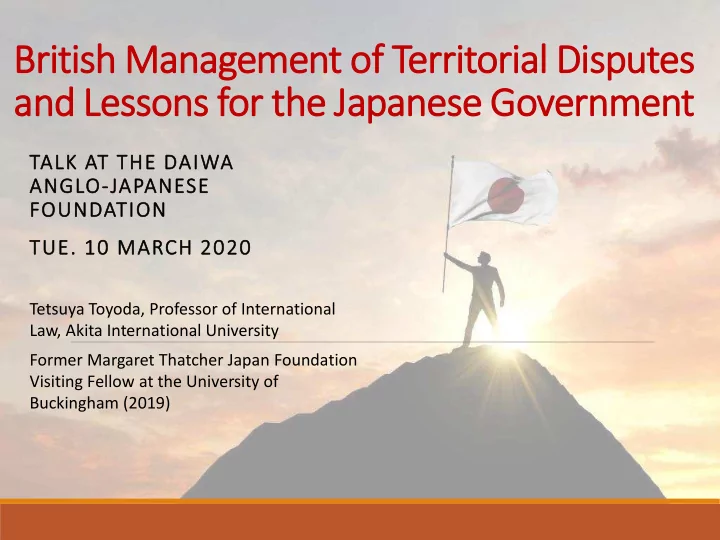

British Management of Territorial Disputes and Lessons for the Japanese Government TALK AT THE DAIWA ANGLO-JAPANESE FOUNDATION TUE. 10 MARCH 2020 Tetsuya Toyoda, Professor of International Law, Akita International University Former Margaret Thatcher Japan Foundation Visiting Fellow at the University of Buckingham (2019)
British Management of Territorial Disputes and Lessons for the Japanese Government 1. Why this topic is worth discussing 2. The three Japanese territorial disputes 3. The British practice of judicial settlement 4. Defeat in the Chagos Islands case 5. Politics of international law and the ICJ 6. Lessons for the Japanese government and people
1. . Why th this topic is is worth dis iscussing 1) For Japanese diplomacy. 2) After-effects of an empire. 3) Significance of the Chagos case.
2. The three Japanese territorial disputes 1) Senkaku/Diaoyu/Diaoyutai 2) Dokdo/Takeshima 3) Southern Kurils/Northern Territory 4) Two disputes with the U.K. in the past
3. . British practice of f ju judicial settlement of f territorial dis isputes 1. Before WWII ◦ 7 cases with the U.S. ◦ 4 cases with Portugal ◦ 2 cases with Germany ◦ 1 case each with France, Transvaal Republic, Venezuela, and Brazil. 2. After WWII ◦ Minquiers and Ecrehos (1953) and the continental shelf (1977). 3. Remaining Disputes ◦ Chagos, Falkland, Cyprus, Gibraltar, and Foyle and Carlingford
4. Defeat in the Chagos Islands case Chagos was without link to Mauritius before colonization. [Statement by the U.K.] “Mauritius cannot get around the basic fact that its elected representatives agreed to the detachment of the Chagos Archipelago in the years leading up to independence, and likewise that Mauritius subsequently reaffirmed its consent post- independence.” [Statement by Mauritius] “the so - called “consent” which was given was extracted in circumstances of duress and on conditions that vitiated any notion that it was freely given.” [Statements by Cyprus] “… any such excision of territory prior to or at the time of independence is inherently suspicious and in any case is not permissible without the free and continuing consent of those entitled to exercise the right of self- determination.”
5. Politics of international law and the ICJ 1. Overwhelming support for Mauritius in the ICJ. 2. How the 15 judges are elected. 3. The principle of consent-based jurisdiction in danger. 4. International legal title is still based on the acquiescence (consent) of the potential contenders, but the requirement for valid acquiescence seems changing.
6. Lessons for the Japanese government 1. The Senkaku/Diaoyu/Diayutai case 2. The Dokdo/Takeshima case. 3. The new way to use advisory proceedings in the ICJ. 4. By the way, winning a dispute may not be always the best solution.
Recommend
More recommend